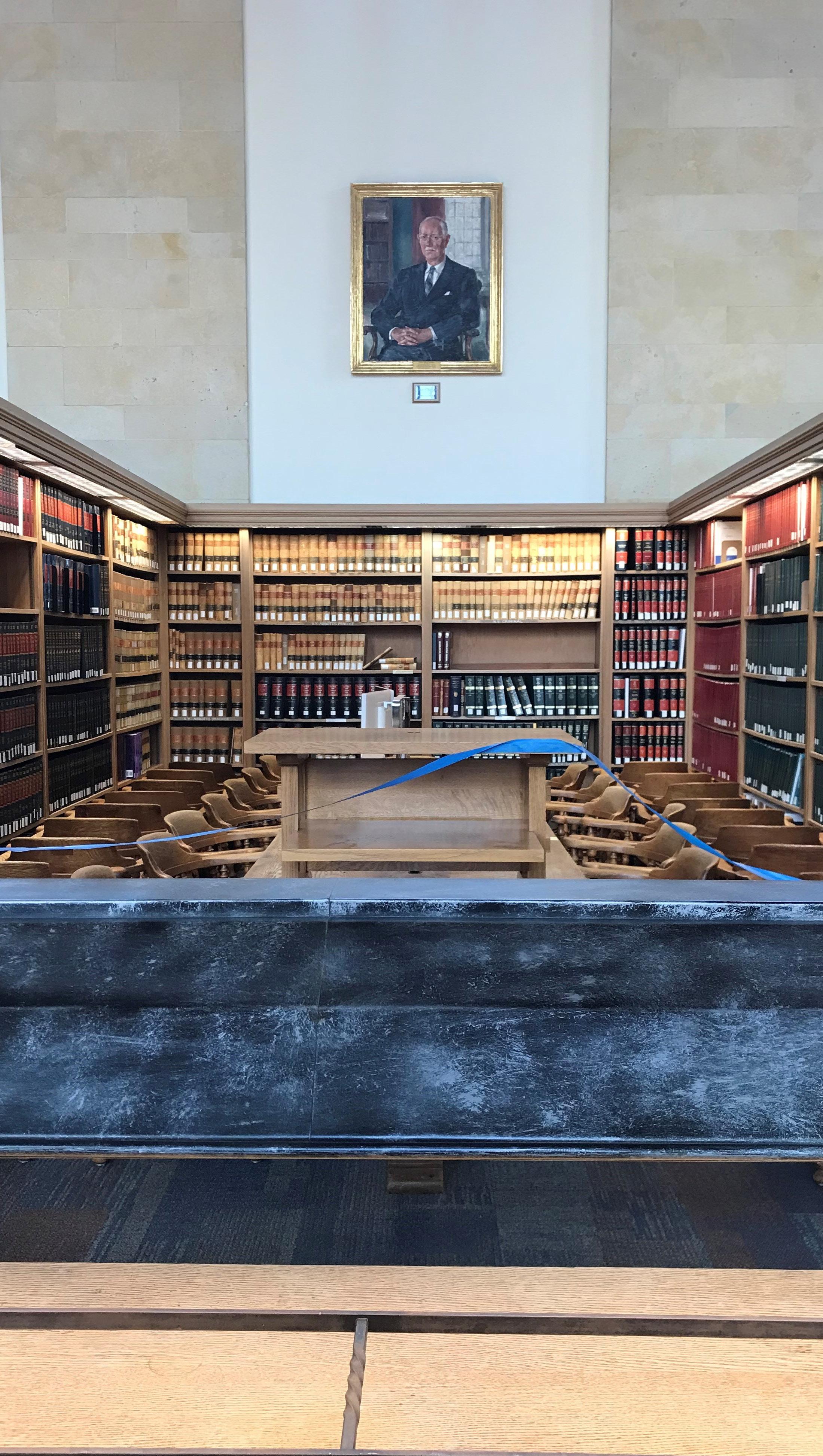
CORNELL UNIVERSITY LAW LIBRARY A YEAR IN REVIEW 2020-2021
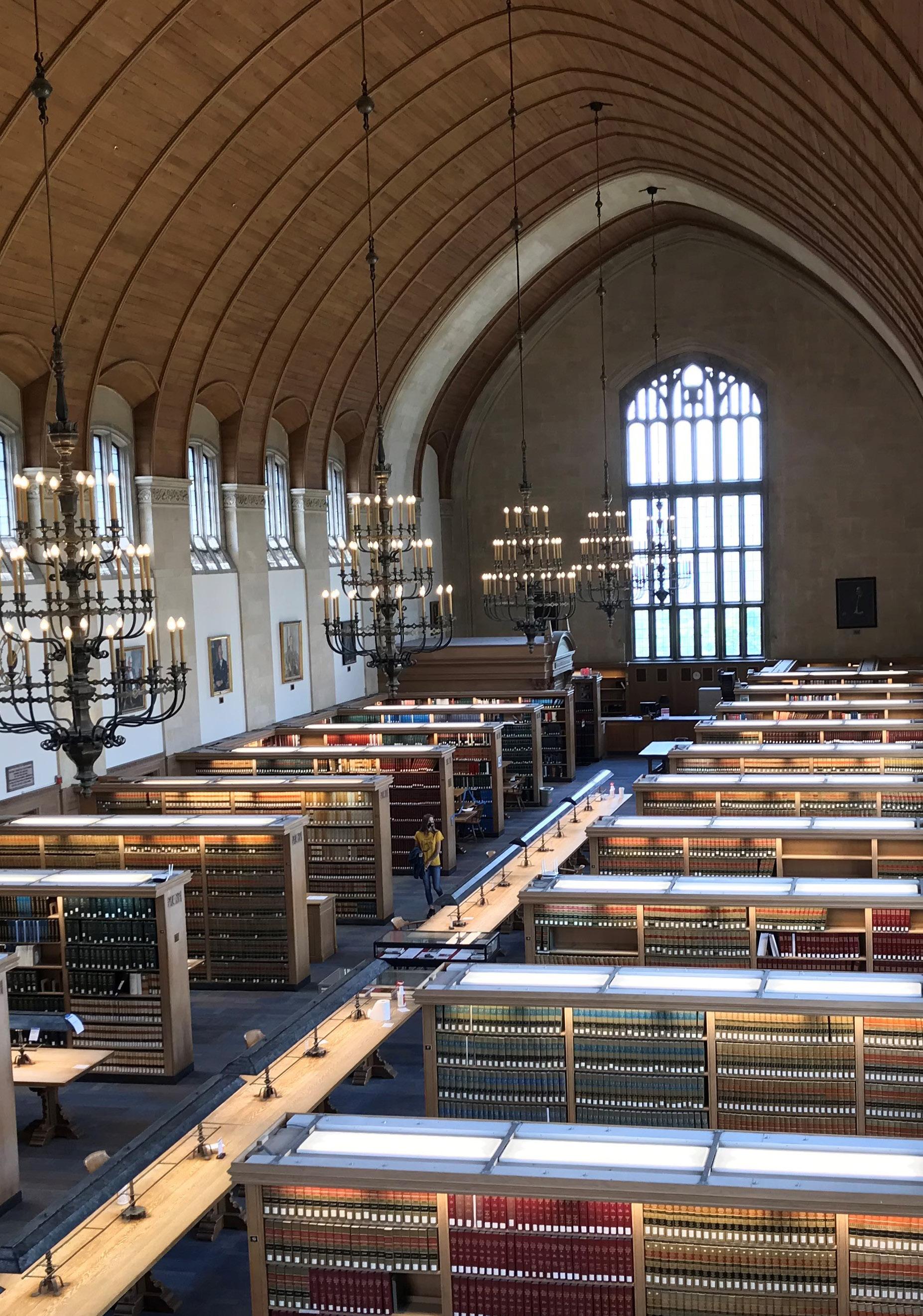
Message from the Director A Hybrid Law Library 2020 - 2021 Staff Updates The Future of Libraries is Open Cantwell Research Prize Professional Highlights By the Numbers Gifts to the Law Library 1 2 9 12 13 14 17 19 CORNELL UNIVERSITY LAW LIBRARY A YEAR IN REVIEW 2020-21
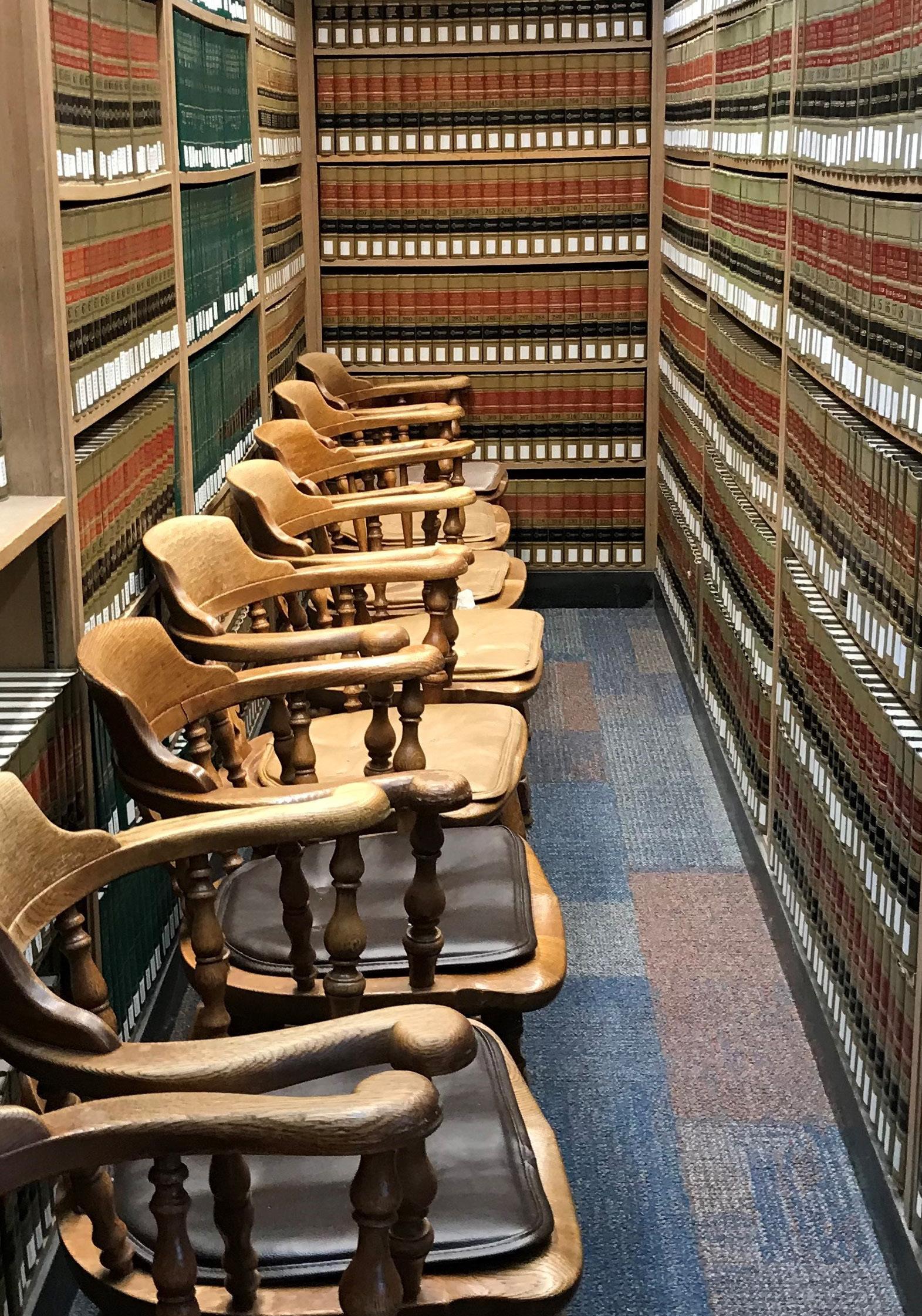
MESSAGE FROM THE DIRECTOR
Cornell Law Library, like much of the world, faced a challeng ing year. Once again, our team rose to the challenge. We had closed out the preceding year feeling reasonably safe in Itha ca, and proud of our achievements: We had mastered remote work and initiated creative innovations to enable our students and faculty to complete an academic year like no other.
By July 2020 we understood we were not looking at just a few weeks of temporary work alterations. We were looking at the need to reimagine and transform Law Library services during an ongoing pandemic. We built new collaborations with Law School and University Library partners to address our shared and specific challenges. And we devised strategies to address other realities of the world around us: Structural injustices did not arrive in 2020, but by 2020 it was time to take active steps to create the world we want to see. Among the Law Library’s new initiatives are proactive learning programs, inclusive and anti-racist collections, and cre ative technologies to distribute equitable learning and resources.
2020 also presented a university-wide hiring limitation, which landed just as several col leagues had taken new steps in their career or life journeys. We redesigned services and redefined priorities to make the most of our team, using remote learning and collabo rations to continue to provide the services our Law School has come to expect from us. We did recruit one new law librarian, whom you’ll read about in this Report. I’m excited those hiring limitations are now lifted, giving us new opportunities for further recruitments.
2020 brought one more significant development: Our Dean Eduardo Peñalver an nounced his appointment as President of Seattle University, effective July 2021. I am at once excited for Dean Peñalver and incredibly sad to see him leave us. But I am delight ed that, in June, Jens Ohlin was named the Allan R. Tessler Dean of Law, and I look for ward to leading the Law Library in alignment with his vision.
Kim Nayyer Edward Cornell Law Librarian
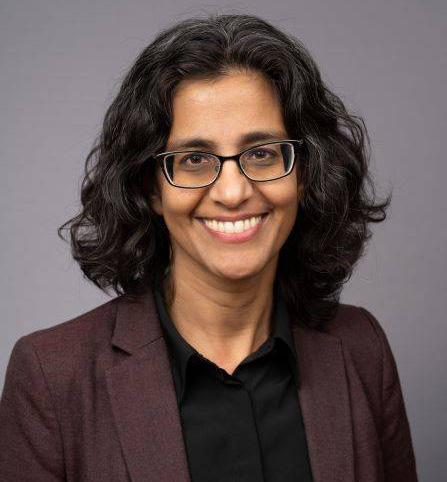
1
A HYBRID
Preparing the physical library for a socially-distanced school year was a major undertaking that required constant pivoting, invention, and reinvention. While over 400 seats are available during normal operations, social distancing re quirements reduced the number of seats available to about 100. A dedicated team of library workers numbered, labeled, and added each available seat to an online seat reservation system. At the same time the team either taped off or moved each unavailable chair. Masses of chairs were used to block off areas that could not be used. Signage was placed on all seven floors of the li brary, and renewed repeatedly in response to evolving policy and guidance. Policies for use of space evolved and changed as well, while we worked cre atively with Law School colleagues to ensure sufficient online learning and study space.
In the hybrid environment, equity demanded that the Law Library shift from physical to online course reserves. This new service with attendant new work flows allowed the Law Library to make digital materials needed for teaching available on course websites upon request of Law faculty.

2
LAW LIBRARY
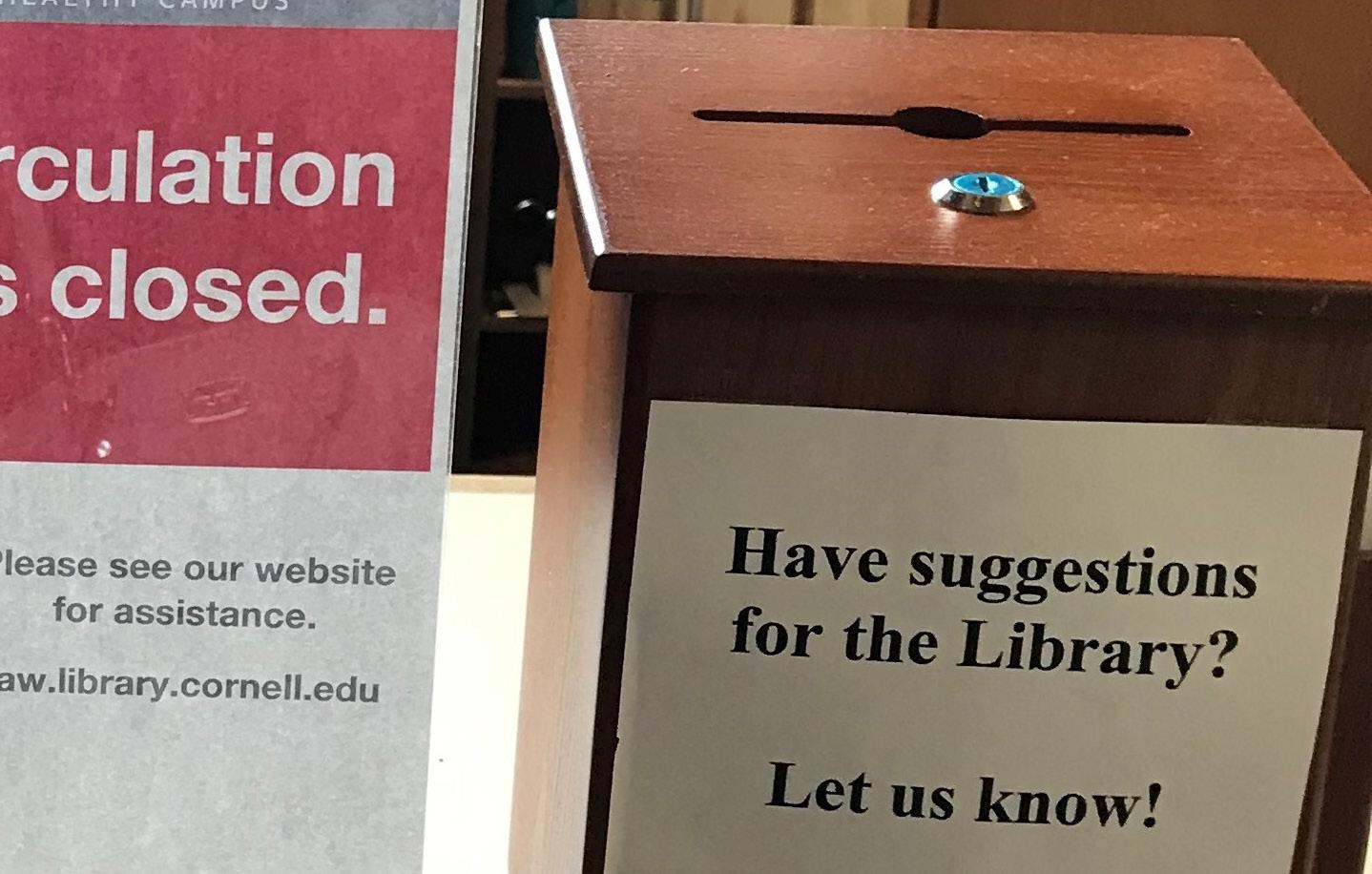
The service required thousands of scans to be made by library staff and stu dents, and included the first two-to-three weeks of reading from casebooks and other assigned reading. Supply chain delays for books meant that many students weren’t able to get their books by the first day of class, but the Law Library’s service allowed students to keep up with their reading.
A skeleton team working onsite continued to loan and process returns of books and other materials via contactless pickup, including materials received from libraries within and outside of Cornell University. The Library continued to pro vide its scanning service from materials in its collection, a particularly valuable service in a year when many students and faculty were studying and work ing remotely. The hard-working scanning team, made up of both permanent staff and student workers, was able to support continued interlibrary docu ment delivery on an international basis at a time when many institutions had to close their onsite services due to the pandemic. And as always the Law Library worked tirelessly to borrow materials through interlibrary loan for stu dents, faculty, and scholars.
3
Throughout 2020-2021, Cornell Law research librarians were actively pro viding reference services and teaching via email and Zoom. They regu larly provide valued reference services by email, helping students, faculty and others in our community with their legal information inquiries. Often longer consultation and research assistance appointments are needed. While these meetings could not take place in person, the need for this ser vice continued. Research librarians held numerous one-to-one and group research consultation meetings with students and other researchers via videoconference.
Librarians also teach and offer workshops over the course of the year. Most library instruction took place online this year, but in Spring 2021 some courses were able to return to the classroom, including librarian Alison Shea’s two-credit course in Foreign and International Legal Research. Topically, the librarians broke new ground by offering a workshop intro ducing students to picking a topic for researching a seminar paper or note, and in Lawyering sections, where Edward Cornell Law Librarian Kim Nayyer introduced 1L students to Critical Legal Information Literacy.
Law librarians regularly create and maintain research guides, which cu rate legal resources and describe research strategies for different legal topics or skills. This year, the Law Library once again focused on the sub ject of need for our students and faculty, creating new research guides on structural racism and the legal system and resources for protesters.
4

5
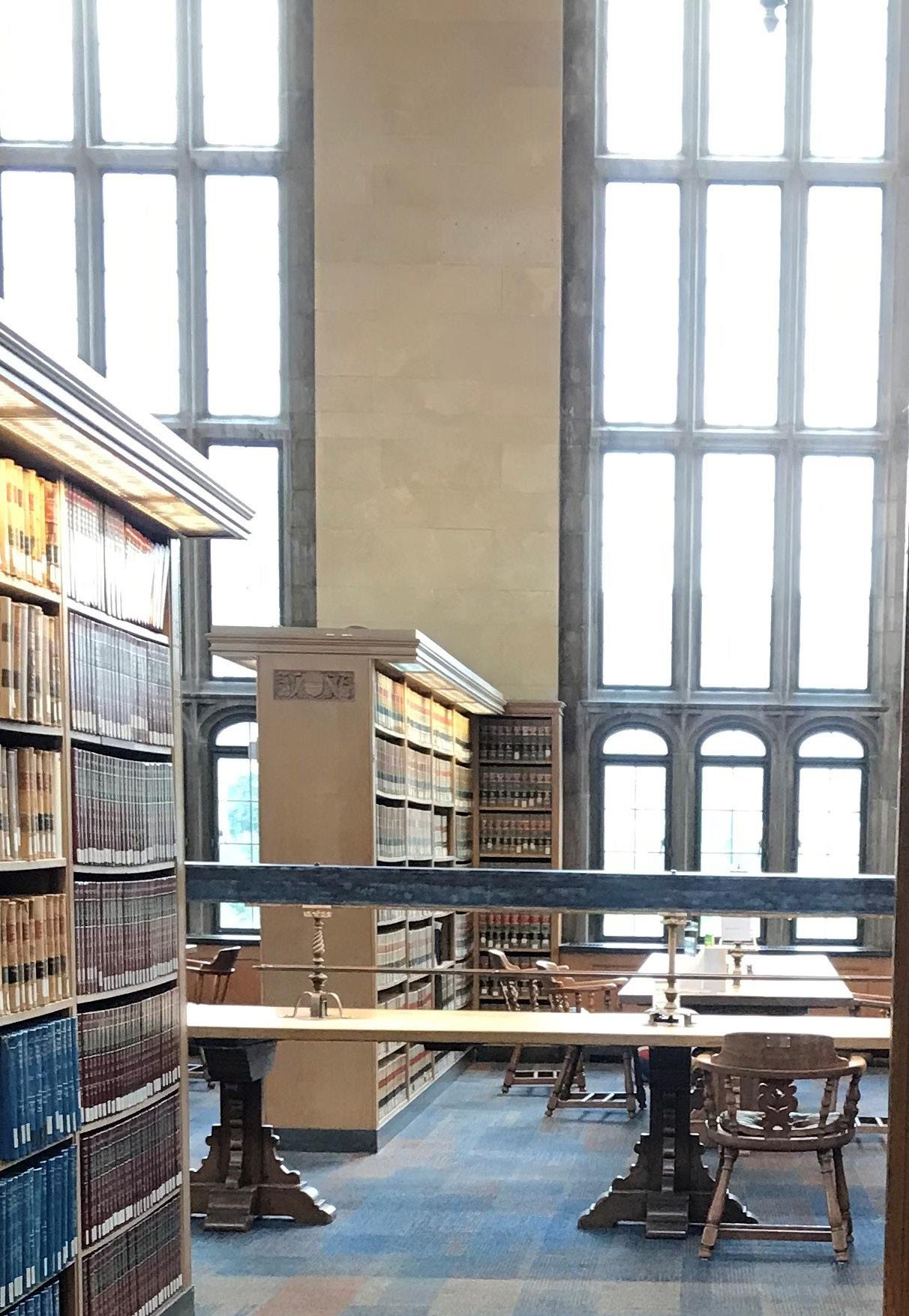
LAW SCHOOL COURSES TAUGHT BY LAW LIBRARIANS • Supervised Writing: Content Moderation or Regula tion?: A Comparative View • Advanced Legal Research in Business Law • Comparative Copyright and Knowledge Protection • Foreign, Comparative, and International Legal Research • Law Practice Technology • Lawyering (6 sections, research portion) • Principles of American Legal Writing (3 sections, re search portion) • Directed Reading 6
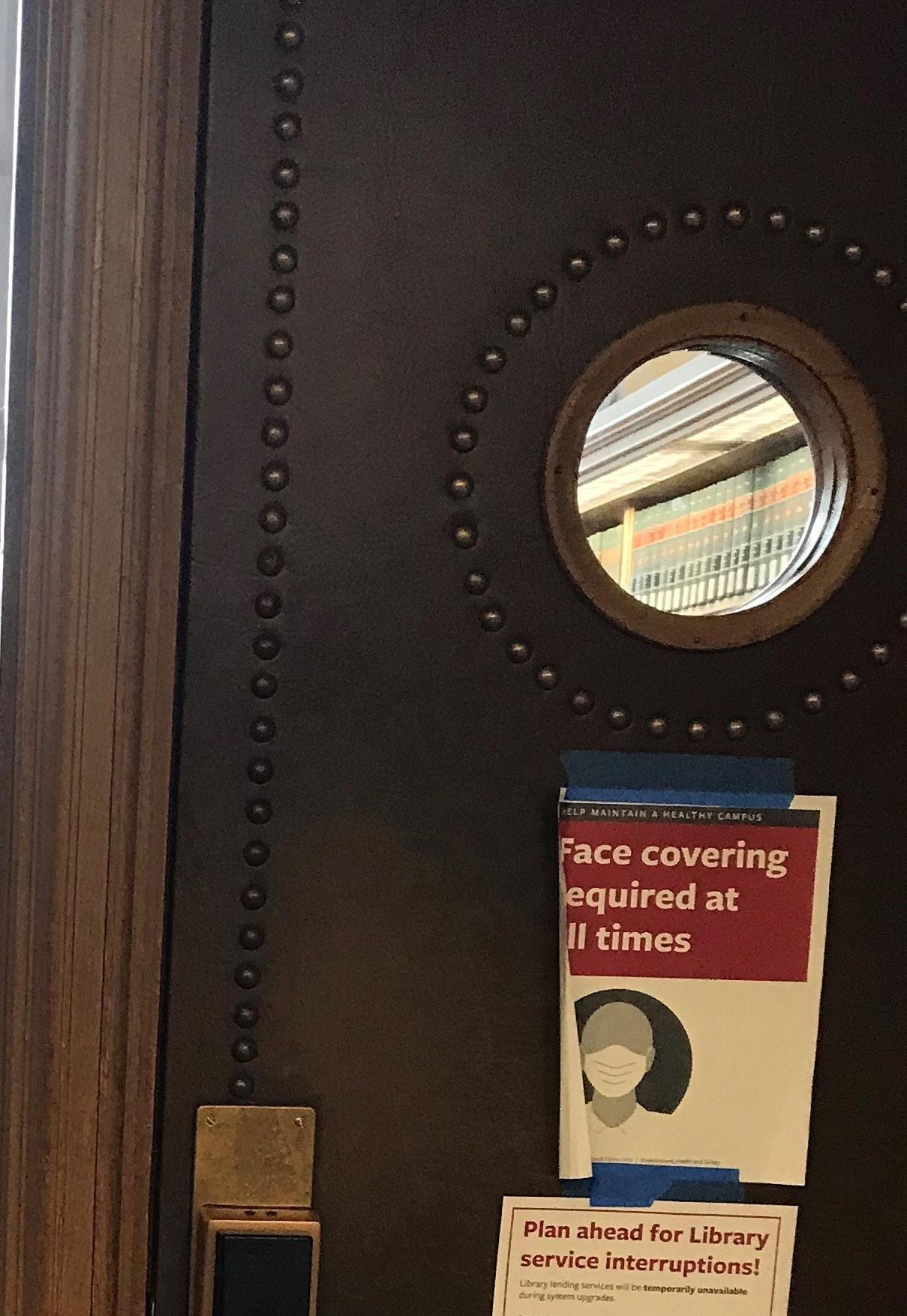
7

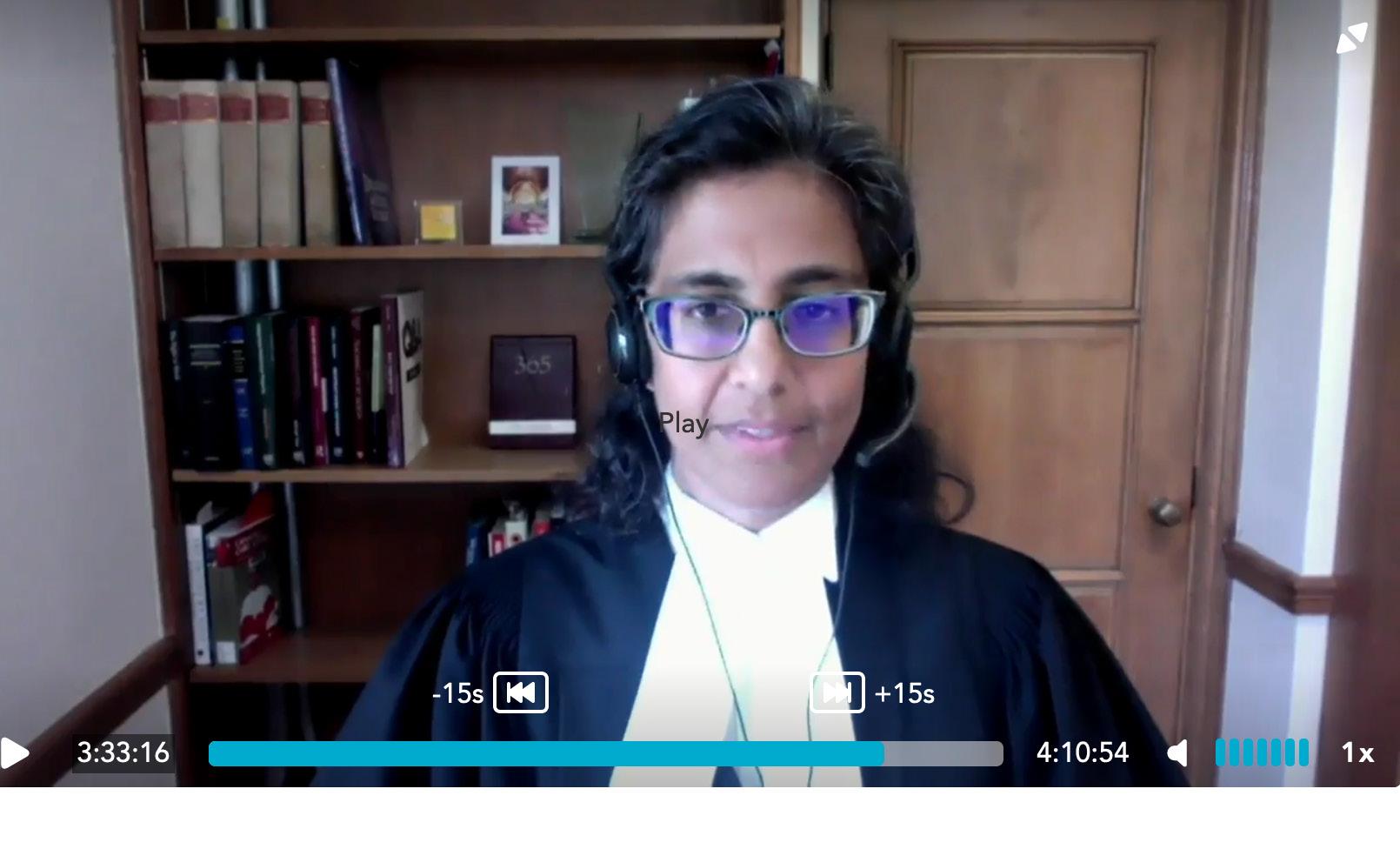

8
The Law Library bid a fond farewell to Access Services Department Coordinator & Faculty Services Associate Kathleen Hartman upon her retirement in September 2020. During her 42-year career at CUL, Kathy was a kind leader and invaluable support for her colleagues. Her breadth of ILL skill was never more apparent than during the initial days of the COVID-19 shutdown; the law school community was truly fortunate to have her valuable expertise during this time.
Peter Hook, Head of Digital & Scholarly Services & LawArXiv Administrator left Cornell in July 2020 to become Associate Di rector of the Notre Dame Law School Law Library. Peter’s work managing the library’s electronic resources was especially in strumental during the COVID-19 emergency, ensuring that re search could continue despite lack of physical access to the library. Peter taught and presented on many topics at Cornell including scholarly repositories, litigation analytics, and legal research pedagogy.
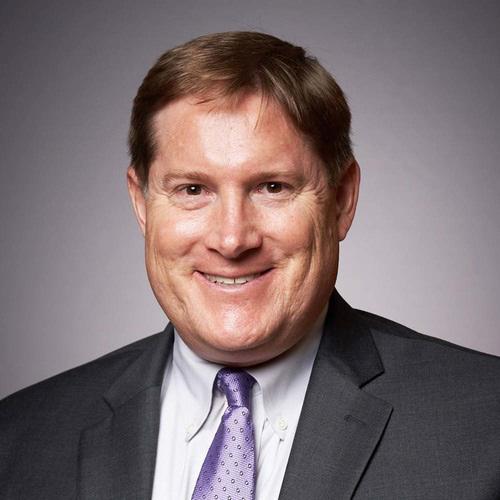
The Law Library was pleased to welcome Nicholas Norton as the Research Resources and Inclu sivity Initiative Librarian in March 2021. Nicholas is a legal information professional with a passion for el evating diverse voices and advocating for equi ty, and his work will assist the Law Library to increase inclusivity in our collections, services, and spaces.

Top Photo: Kim Nayyer makes oral submissions in a virtual appeal at the Supreme Court of Canada, advocating law libraries’ perspectives on use of copyright-protected legal materials. This is believed to be the first appearance by a law librarian before the SCC.
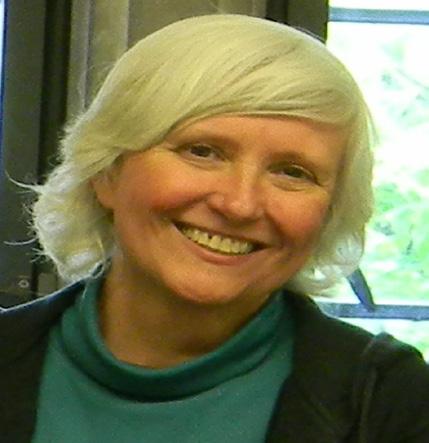
Middle: Information Management weekly Zoom meeting picturing (top row from left): Sally Butterfield with Richie, Jackie Magagnosc, Jean Pajerek; bottom row from left: Ula Knepper, Elizabeth Teskey with Snowy, Janice Pfaff. Also present but otherwise engaged at the time of the meeting: Aurora, Guy Noir, Cassiopeia, Cedar, Minx, Panda, and Fern. Also Mr. Higgins who is not a cat.
Bottom Photo: Administrative Manager Cassi Norgaisse in Cornell University Library’s 2020 Orientation Video “18 Secrets of the Library”
2020 - 2021 STAFF UPDATES
9
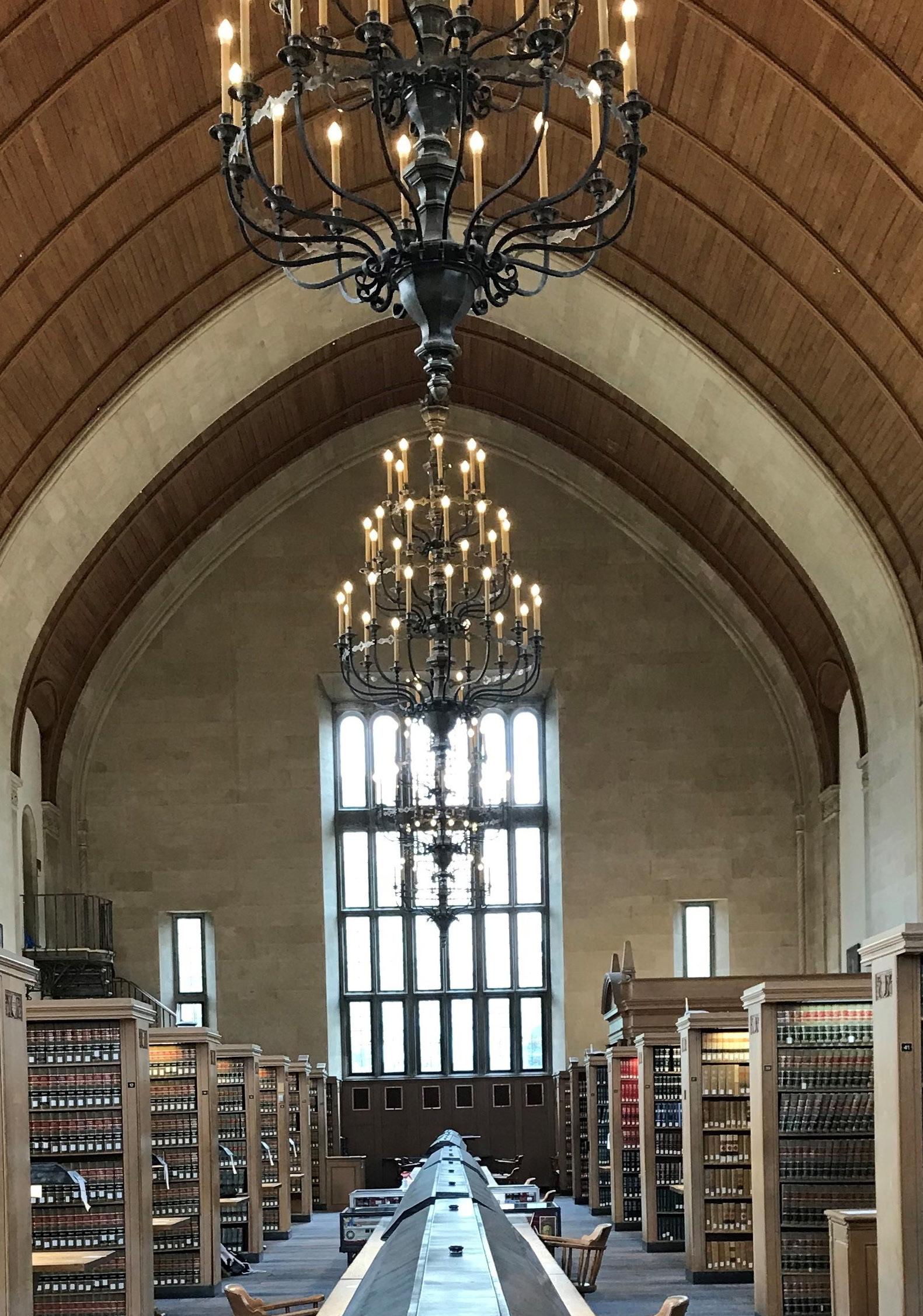
10
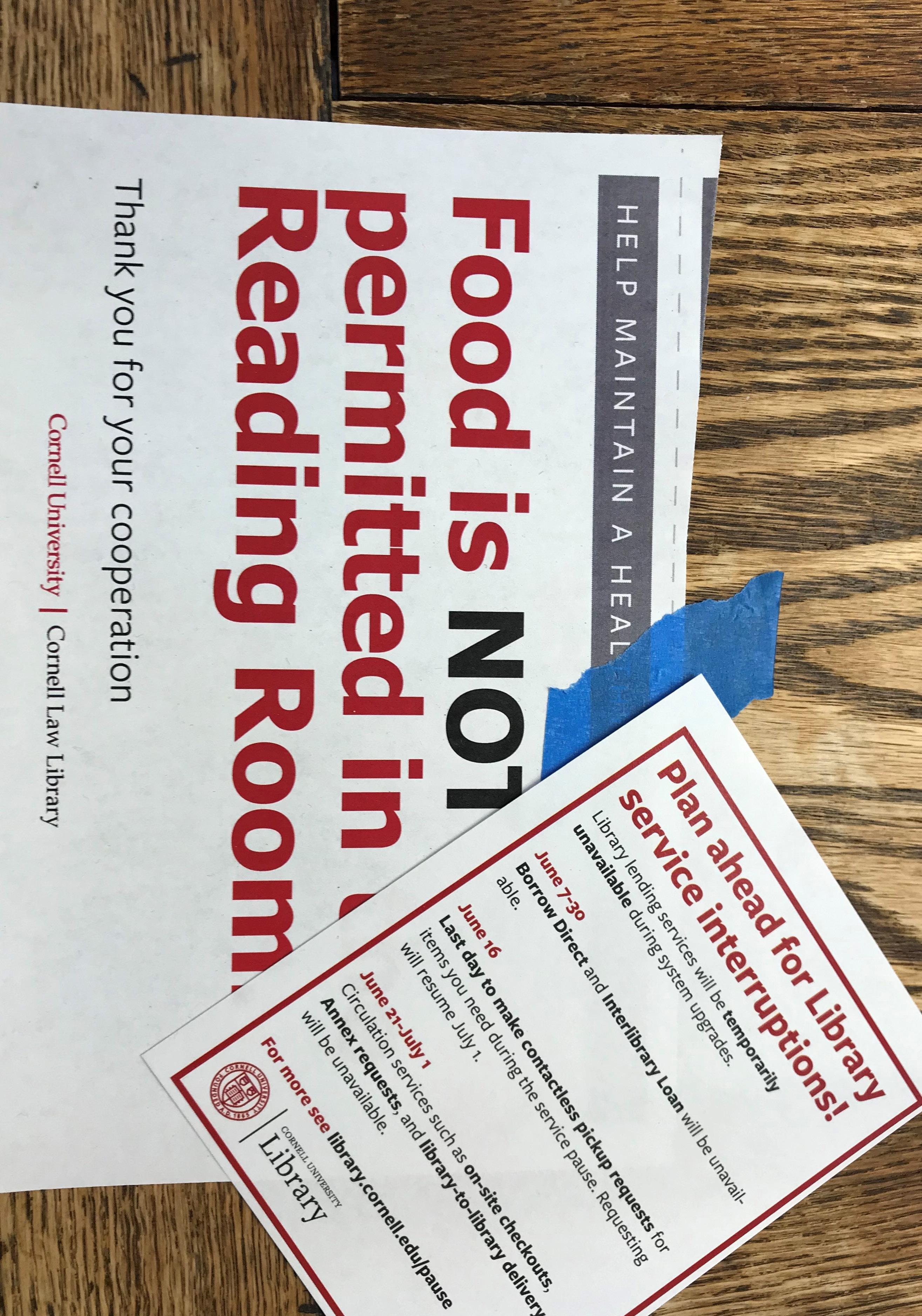
11
THE FUTURE OF LIBRARIES IS OPEN
After five years of focused, dedicated effort on the part of dozens of individuals at Cor nell and around the world, Cornell University Library, including the Law Library, implement ed its new Library Services Platform (LSP) on July 1, 2021. The new system, called “FOLIO” (which stands for “the Future of Libraries is Open”) is based on collaboratively-developed open source software designed to be flexible and responsive to the library’s needs. The system supports the administration and provision of essential library services such as order ing, paying for, cataloging, and lending out library resources.
Although the implementation of the new system is largely invisible to library users, its im pact on library staff and their workflows is profound, as we learn to work in FOLIO and re imagine how tasks are accomplished in the library. The FOLIO community, which includes libraries, developers, and commercial entities, is committed to continuous improvement of the system, with the needs of libraries as its central focus. Cornell University Library will sustain its high level of involvement in the governance and development of FOLIO in the years ahead as we forge a new path for libraries, by libraries.
Since September 2019, several law library staff worked alongside library colleagues across the university as members of the following CUL FOLIO-related and special interest groups:
CUL FOLIO Bug-tester
CUL FOLIO Implementation Team
CUL FOLIO Training Team
CUL FOLIO Technical Services Training Team (team leader) – we developed and present ed weekly FOLIO training sessions every week between late March and early July 2021
CUL FOLIO Core Reporting Team
FOLIO Reporting Special Interest Group
FOLIO Acquisitions Special Interest Group
FOLIO Metadata Management Reporting Group
FOLIO Implementation Group
12
FIRST PRIZE Insanity Step Zero: A Modern Application of M’Naghten’s Question Four Test by Michael Mills, Class of 2021 (JD)

When planning his paper on how delusions affect the insanity defense, Mi chael Mills knew he would need to look not only to both current and histor ical legal analysis but also psychology research to build his argument. In his paper, Mills proposes that judges look to the lesser-known fourth ques tion of the famous M’Naghten’s Case, which he suggests be viewed as a “step zero” test when evaluating the insanity defense with specific regard to defendants suf fering from delusions. Mills began with dictionaries, textbooks, and research starters to grasp the psychological concepts and then moved on to literature in psychological journals and books to explain to the reader what a delusion is and how it should impact the insanity test. One of the most important lessons Mills took from this paper-writing process was the importance of planning ahead, as many quality sources necessary for his analysis were only available in print or from da tabases he was unfamiliar with; without these historical and non-law resources, he believes the quality of his paper would have suffered.
SECOND PRIZE
Iconic Designs, Icon Status, and Intellectual Property: Discussing Copyright and Fashion and the Ideal Mode Of Protection for Fashion Designs and Patterns by Bianca Lindau, Class of 2021 (LLM)

Bianca Lindau’s paper begins with a striking illustration of the prices fash ion designs can command—handbags worth from $7,000 to over $300,000. She then compares the available intellectual property protections in the U.S., the E.U., and Germany for fashion designs—designs that depict the “shape, style, cut and di mensions of an article of clothing or an accessory graphically, in order to enable the transforma tion of fabric into a finished article of clothing or an accessory.” Based on her comparison, she rec ommends that the US increase its protections for intellectual property rights in fashion design with a dual system of unregistered and registered designs to afford fashion designers the flexibility they need while not unduly hindering competition. To reach these conclusions, Bianca researched ap plicable and proposed intellectual property laws in the three jurisdictions. U.S. research included a deep dive into legislative history of two Congressional bills; European Union copyright laws touch ing upon the issue were examined; and German statutory and regulatory laws affecting fashion were studied.
About the Cantwell Prize:
Funding for the Prize is provided by an endowment given to the Law Library by Barbara Cantwell in honor of her late husband, Robert Cantwell, a 1956 graduate of Cornell Law School.
CANTWELL RESEARCH PRIZE
13
PROFESSIONAL
§
JACKIE MAGAGNOSC
“Making change that matters in the library catalog.” (with Laura E. Daniels and Margaret F. Nichols) Catalogue & Index 202 (March 2021)
§ Information Management Content Area Team Lead, American Association of Law Libraries Annual Meeting Program Committee for 2021 conference.
§ Coordinator, “Library Infrastructure 101: Technical Services’ Role in Building
Your Public Service Foundation and Bridges to Patron Success”, 2021 AALL Virtual Annual Meeting.
§ Chair, American Association of Law Libraries, Technical Services Special Interest Section Awards Committee.
§ Member, American Association of Law Libraries, Technical Services Special Interest Section Professional Development Committee.
§ Editor and Columnist, Technical Services Law Librarian Conference Roundup column.
§ Member, Cornell University Library Inclusive Description Taskforce, Controlled Vocabularies Group.
MATT MORRISON
§ Member of AALL Awards Committee that determines winners of the three most important awards for AALL members
§ Attendee of AALL Summer Annual Meeting.
KIM NAYYER
§ Published “Engaging Respectfully With Indigenous Knowledges: Copyright, Customary Law, and Cultural Memory Institutions in Canada” in KULA: Knowledge Creation, Dissemination, and Preservation Studies
§ Published “Issues and Intersections of Indigenous Knowledge Protection and Copyright for Digital Humanities” in Access and Control in Digital Humanities
§ Researched and co-wrote amicus brief and presented oral submissions before the Supreme Court of Canada, on copyright issues and law libraries
§ Named President, Canadian Association of Law Libraries, the first president of color in CALL’s 49-year history
§ Presented in panel, “Diversity Shares: Listen to Learn” for the 2021 PLLIP Diversity Summit: “From Difficult Conversations to Collaborative Action”
§ Presented in panel “Imagining Sustainable, Global, Open Published Legal Scholarship” at Law Via the Internet 2020
§ Presented in panel “The Potential of LIIs in Data Bias Mitigation” at Law Via the Internet 2020
§ Co-authored published abstract “Sharing is Daring: Global Copyright Laws, Knowledge Protection, and the Impact on Open Digital Humanities”, DH2020
§ Led discussion program “Data Literacy Integration in the Law School Curriculum”, SubTech 2020
14
HIGHLIGHTS
§
NICHOLAS NORTON
Author, “An Essential Reading List on Police and Pride,” Advocate Magazine
§ Panelist, “Cataloging Queer Library Issues: A Symposium to Honor Walt ‘Cat’ Walker,” Loyola Marymount University
§ Member, CUL Outreach & Engagement Committee
§ Member, CUL Diversity, Inclusion, and Belonging Council
§ Member, CUL Repository Coordinating Committee
JEAN PAJEREK
§
Continued to serve as a member of the CUL Early Career Voluntary Review committee; participated in a virtual panel discussion about the CUL promotion process
§ Served on search committee for Law Library Research Resources and Inclusivity Initiatives Librarian
§ cataloging code
§ Taught five, 2-hour sessions on OCLC searching to CUL staff members as part of effort to prepare library staff for next year’s deployment of new library services platform
§ Continued to serve on CUL’s promotion to Librarian review board
§ Appointed to CUL FOLIO Reporting Core Group and CUL FOLIO Implementation Team; participated in group presentation for CUL staff members by the CUL FOLIO Core Reporting Team
§ Appointed to CUL Academic Early Career Voluntary Review Program committee; participated in virtual panel discussion, “CUL Annual Academic Promotion Review”
JACOB SAYWARD
§
Chair, AALL ALL-SIS Faculty Services Committee
§ Mentor, AALL Leadership Academy
§
Presented CALIcon program on Remote Adjustments to a Law Practice Technology Exercise on Case Management Systems
15
PROFESSIONAL HIGHLIGHTS (CONT.)
NINA SCHOLTZ
§ Leadership team of Association of Law Libraries of Upstate New York
§ Member, AALL Indexing of Periodical Literature Committee
§ Member, ALL-SIS Newsletter Editorial Board, and co-editor of Member News Column
§ Member, CUL Instruction Team; subteam lead, CUL LibGuides Subteam
§ Member, CUL Discovery and Access User Representatives Team
ALISON SHEA
§
Authored “FCIL Librarians Respond to the COVID-19 Pandemic.” 35(1) FCIL Newsletter 1 (October 2020)
§ Received American Association of Law Libraries Foreign, Comparative and International Law Special Interest Section Blog Post of the Year Award for Locating EU and UK Guidance on Brexit (July 2020)
§ Chair of the Cornell University Library Liaison Steering Team (2020-21)
§ Coordinator and moderator, ALA 2021 Annual Conference Virtual on-demand program, “Learning International: Stories from the Field” (June 2021)
§ Coordinator and moderator, BIALL 2021 Online Annual Conference program, “Making the Case for Legal Tech” (June 2021)
SABRINA SONDHI
§ Chair, AALL Academic Law Libraries Special Interest Section (“ALL-SIS”)
§ Author, “From the Chair,” ALL-SIS Newsletter, vol. 40, issues 1-4
§ Co-Chair of the Content Group for the Academic Law Libraries: Statistics, Analytics and Reports (“ALLStAR”) Advisory Board
§ Member, CUL Access Services Policy Team
§ Member, CUL Outreach and Engagement Committee
16
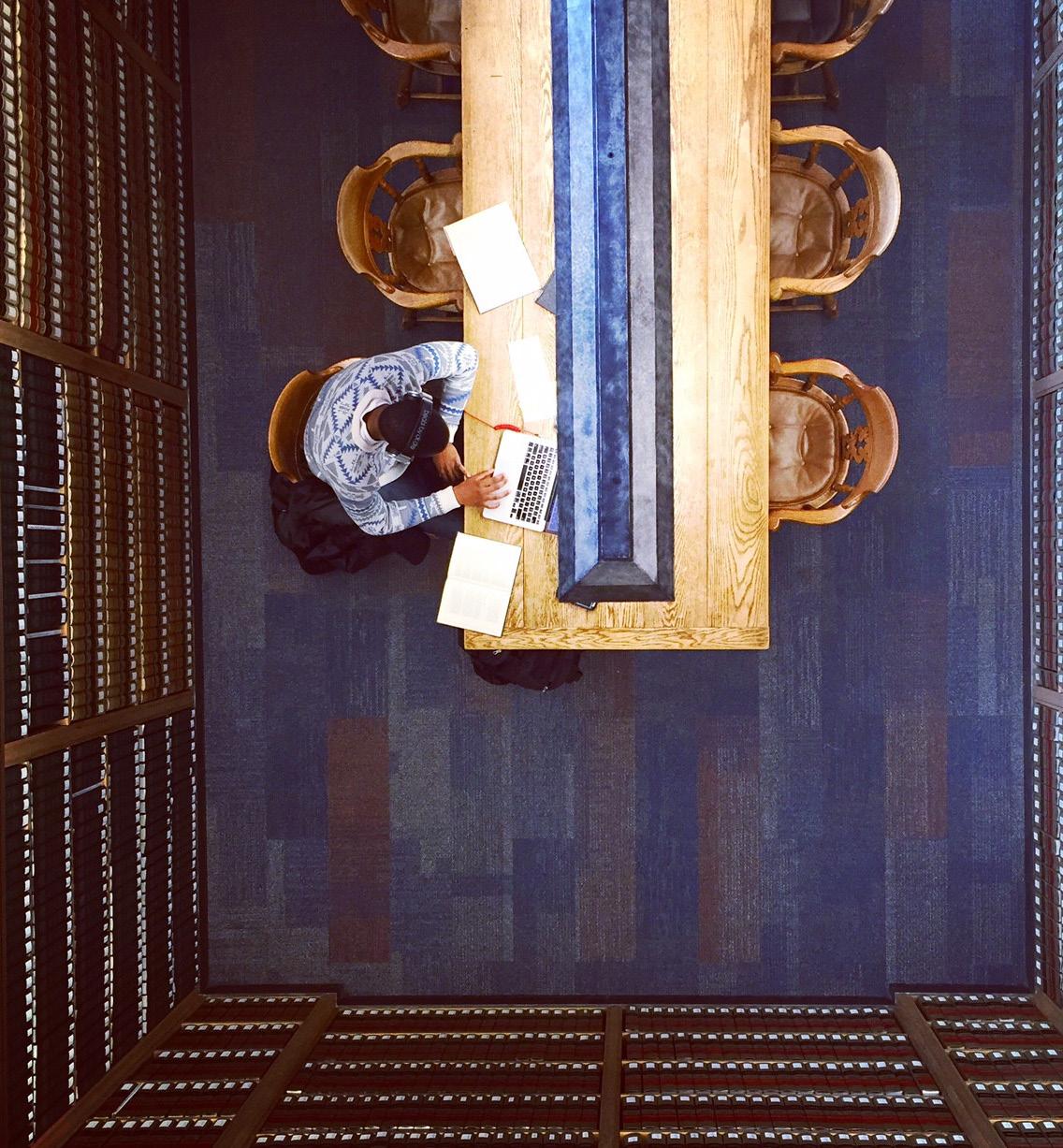
CORNELL LAW LIBRARY 2020 - 21 By the Numbers NEW TITLES ADDED 19,123 NEW GUIDES CREATED 5 SCHOLARSHIP@CORNELLLAW DOWNLOADS 1,103,082 RESEARCH GUIDES VIEWS 64,171 WORKSHOPS PRESENTED 3 LAW SCHOOL COURSES TAUGHT 7 REFERENCE/RESEARCH SESSIONS 861 17

18 $2,000 – $ 2,500 (PATRON LEVEL) EDWARD W. BERGMANN J.D. ‘66 HENRY H. KORN A.B. ‘68 VALERIE J. ARMENTO J.D. ‘77 WELLS FARGO ADVISORS, LLC $500 –$1,500 (ASSOCIATE LEVEL) WALTER G. VON SCHMIDT J.D. ‘70 WILLIAM L. HOFFMAN J.D. ‘92 $100 – $300 (SUPPORT LEVEL) ALFRED R. JOHNSON JR A.B. ‘76 JAMES A. MCBRADY J.D. ‘89 JOHN F. MULCAHY J.D. ‘59 Have questions or wish to make a gift to the Law Library? Contact the Law School Development Office at (607) 255-5877 or giving@lawschool.cornell.edu WE GRATEFULLY ACKNOWLEDGE THE FOLLOWING GIFTS RECEIVED IN FISCAL YEAR 2020 - 2021 AND CORNELL UNIVERSITY LAW LIBRARY ENDOWED FUNDS.

19 EARL J. BENNETT MEMORIAL BOOK FUND ROBERT BURNS MEMORIAL BOOK FUND ROBERT CANTWELL A.B. ’53 J.D. ’56 LAW LIBRARY FUND JACK G. CLARKE COMPARATIVE LAW BOOK FUND EDWARD CORNELL LAW LIBRARIAN FUND CUCCIA HONOR WITH BOOKS FUND MARY HEAGEN CUCCIA MEMORIAL BOOK FUND ARTHUR H. AND MARY MARDEN DEAN LIBRARY FUND THOMAS B. GILCHRIST MEMORIAL ENDOWMENT SHEPPARD GURYAN J.D. ’67 LAW LIBRARY ENDOWMENT GURYAN FAMILY LAW LIBRARIAN’S ENDOWMENT KURT HANSLOWE MEMORIAL FUND J. ARTHUR JENNINGS LAW LIBRARY FUND HERBERT D. LAUBE ENDOWMENT FUND LIBRARY DIRECTOR’S DISCRETIONARY FUND JUDGE ALFRED J. LOEW (LL.B. 1921,) MEMORIAL FUND ARTHUR H. ROSENBLOOM J.D. ’59 LAW LIBRARY ENDOWMENT NELSON & HATTIE ROSENBAUM BOOK FUND SONYA A. SASUTA MEMORIAL FUND
Cornell University is located on the traditional homelands of the Gayogohó:no’ (the Cayu ga Nation). The Gayogohó:no’ are members of the Haudenosaunee Confederacy, an alli ance of six sovereign Nations with a historic and contemporary presence on this land. The Con federacy precedes the establishment of Cornell University, New York state, and the United States of America. We acknowledge the painful history of Gayogohó:no’dispossession, and hon or the ongoing connection of Gayogohó:no’’ people, past and present, to these lands and waters.
























